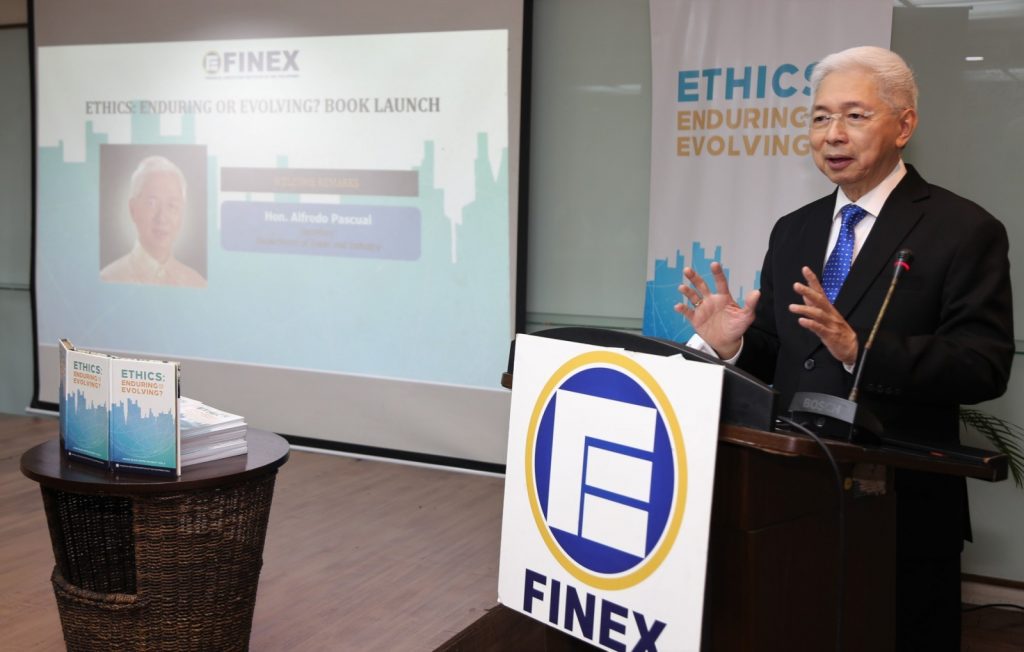
My esteemed colleagues in FINEX, friends, and guests— a pleasant afternoon to you. Welcome to the penthouse of the DTI-BOI Building. DTI offices are spread across 6 buildings along Jupiter Street. I hope that my contemporaries with us now did not find it too challenging to climb two flights of stairs to get to this hall.
We are here this afternoon for the launch the FINEX second book on ethics which is aptly titled “Ethics: Enduring or Evolving?” It is a pleasure for me to host the event. Not just because I am happy to meet long-time friends, but also because I believe in this book project. And by the way, I also contributed an article to the book.
Congratulations to FINEX on this 2nd installment. I am honored to be part of this endeavor together with industry captains–to share our experiences and perspectives about ethics in business and public service, in alignment with FINEX’s strategic priorities of People Development, Stakeholder Engagement, Sustainable Development, Digital Transformation, and Capital Market Development.
The first FINEX book, launched in 2018, was entitled “Ethics: Black, White (or Gray)?” It sought to help define what is right and wrong—in areas such as public service, to doing business in the private sector. The book also tackled how to handle nuances or the gray areas that professionals encounter in their work.
A helpful and functional companion to the first, this second book covers two important topics from the perspectives and anecdotes of its contributors.
- First, it discusses enduring values in doing business, tested by time and passed from one generation of business leaders to the next.
- Second, it tackles evolving ethical concepts that emerge amid our times, when the post-pandemic world offers not only new ways of interacting and doing business, but makes apparent some key ethical issues dilemmas amid such as developments as the Fourth Industrial Revolution, and the compelling challenges of sustainability and climate change.
Principles of ethics govern acts that affect the well-being of others – a common source of dilemma in sustainability challenges. These principles describe what is good or bad, what goals should be pursued, and what actions must be taken. The concept of morality, which deals with personal perceptions of what is right and wrong, is a useful one to consider. Morality and ethics overlap as the ethical may find justification in what we hold as moral.
Given practical realities, ethics are necessary. Even the most well-written laws cannot possibly address every dilemma and every grey area that may arise for business and society. To effectively address complex issues, solutions must be built on a foundation of moral reasoning and an ethos of justice in dealing with employees, customers, suppliers, communities, and other stakeholders. Resort to ethical principles is a must in any reason-based decision-making, be it in business or public service. The reality is that no area of business or human endeavor can be considered beyond the scope of ethics.
Talking of evolving ethics, let me briefly discuss what DTI is doing regarding the ethical deployment of Artificial Intelligence in the country. AI is an emerging technology capable of developing new industries and uplifting the Philippine society. Numerous applications across sectors (health, finance, education, and manufacturing, among others) now use AI. Whether the country is able to maximize its benefits depends on the ability of its champions to wield AI efficiently. Doing so requires a governance framework in the deployment of AI in Philippine society. So, DTI is developing this governance framework guided by the principle of “ethics first.”
Trustworthy AI should be ethical, “respecting ethical principles and values,” in addition to being lawful and robust. Principle-based frameworks lay out the values that will inform a diverse range of AI systems and AI-augmented practices.
The development of an AI governance framework contributes to the country’s attempt to become a more innovative, inclusive, and resilient economy.
In developing the Philippine framework for AI governance and determining its scope and limits, we are ensuring that its developers and stakeholders must be cognizant of the intended utility and inevitable economic, political, and socio-cultural impact of AI in Philippine society. Jumping out of initial discussions with stakeholders is the concern that such a framework might be used to regulate AI systems and practices prematurely. However, questions of government regulations in many parts of the world are no longer about “if” or “when” but “how.” While the EU and the UK have signaled the intent to regulate AI soon, governance is much broader than government regulation or government itself.
Finally, an AI governance framework signals the need for parallel development of a code of conduct by AI practitioners for a progressive industry regulation.
In the book, I shared that climate change solutions will have to consider complex realities. The most significant contributors to climate change, such as the U.S., European Union, and China, are expected to suffer the least. This is while countries in the developing world, like the Philippines, will suffer the most. The lower incomes, less and poor public services, and vulnerable locations of developing economies put them in positions of disadvantage.
But global climate change relates to the ethical issue of distributive justice. Developing-world people have the rights to decent life, basic subsistence, and sustainable development. Those of us in the current generation owe the future generations a world that they can survive and thrive in, too. One of the most fundamental challenges in designing action to global climate change is how to ensure that the world’s poor, as well as younger generations, will not be burdened disproportionately. It is not just governments that have to be involved in global climate change mitigation and adaptation. Businesses and consumers will have to move toward low-carbon and renewable energy directions, for example.
Congratulations again to FINEX. Mabuhay tayong lahat!♦
Date of Release: 29 November 2022


